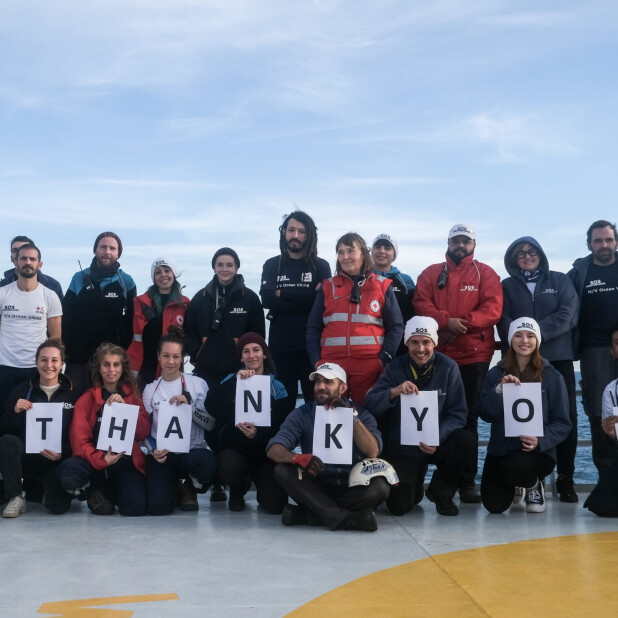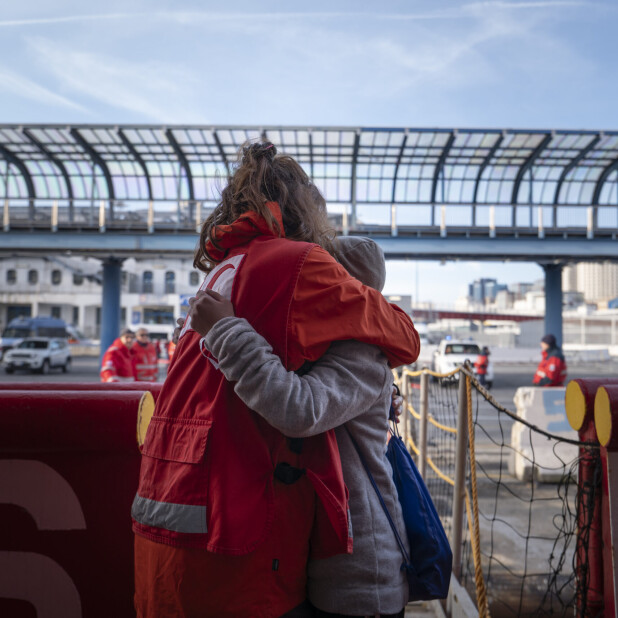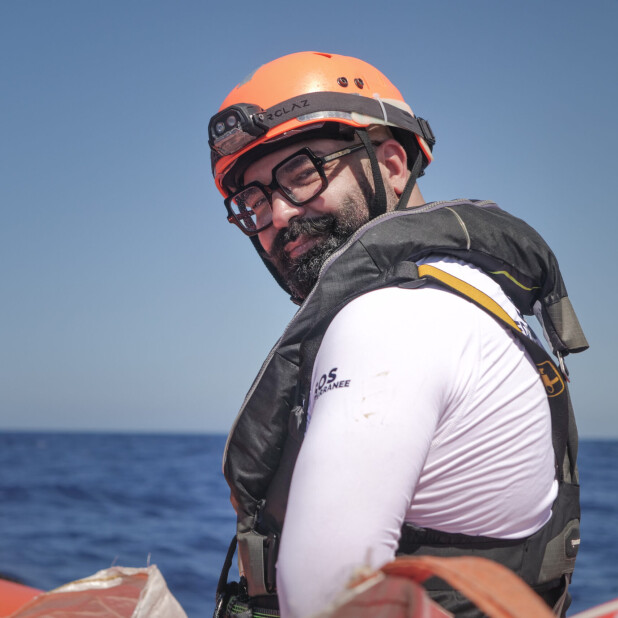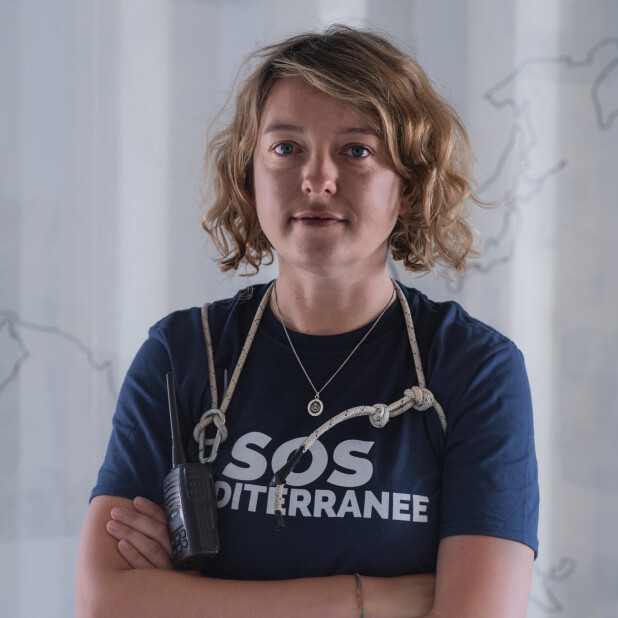
On June 25, the IMO of the United Nations celebrates the Day of the Seafarer. On this day, we reaffirm the rights of maritime workers to personal safety and the importance of team work and mental health on the Ocean Viking.
Meet four members of our ship’s crew to learn about their personal experiences and how they contribute to the wellbeing of the Ocean Viking’s team.
Giannis
Giannis, a professional seafarer from Greece, is a Search and Rescue Team Leader, leading up to 11 crew members in rescue operations. He emphasizes the importance of teamwork and preparation of the crew to minimize risks of loss of life at sea. With limited assistance from state coastguards and constantly changing weather conditions, teamwork and communication are essential to the safety of survivors and the Ocean Viking crew. “Training, comfort, and chemistry are very important for the crew members while working in an environment with many elements being out of our scope of influence.”
Giannis also recounts the memories he has made onboard, some difficult, others beautiful: “it is emotionally very hard [to hear the survivors’ stories]: War, poverty, physical and sexual abuse and inhumane treatment are experiences that have traumatized these human beings that are no different from any one of us.”
But he also recalls the beautiful moments he has shared with the survivors aboard the Ocean Viking. “Nature offers a lot [of beauty], [but] the people we rescue even more. Dolphins, whales, sea turtles, the infinite blue are stunning, but the people laughing and celebrating the feeling of faith and freedom are unique.”
Amine
Amine is a cultural mediator with the Search and Rescue team. During rescue operations, he is the first contact to survivors in distress, communicating with them in English, French, or Arabic. His first words to them are always: “You are safe.”
Amine recalls difficult times aboard the Ocean Viking: “We made one rescue at 9pm, by night. Then there was the second rescue, then the third, and then the fourth. Then it was an unstoppable operation, like 23 hours in a row. I lost the notion of time, and it was very difficult, not only for me, but even for people on the Bridge, and people on board, the medical team. Everyone was exhausted. It took us like four days to recover fully.”
While the Ocean Viking is always prepared to rescue a boat in distress, multiple back-to-back rescue operations can be taxing to the crew members. Amine thinks about the support of his family to continue saving lives. “My daughters, they are very proud of the job I’m doing. In the beginning, it wasn’t clear to them: they were just kids, but now, after all these years, now they are more conscious about what I’m doing. Every time, at the end of the rotation, they receive me with drawings, like me saving people,” he says, tearing up.
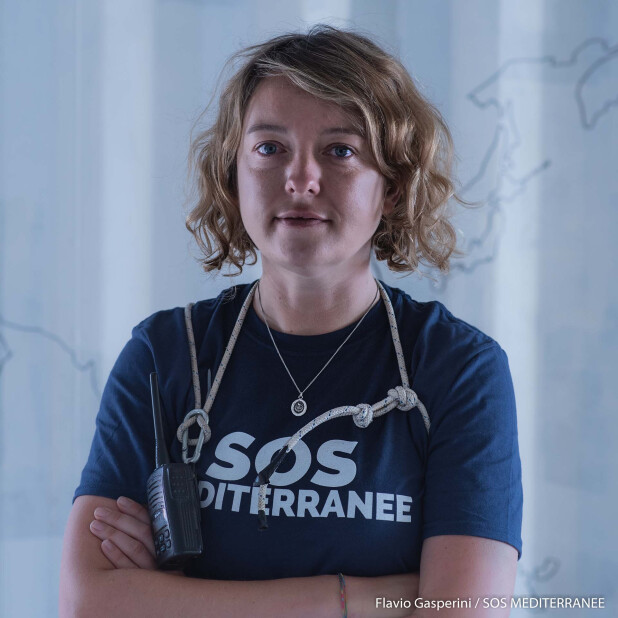
Dominika
As Head of the Medical and Protection Department, Dominika oversees all post-rescue activities in cooperation with the medical and protection teams of SOS MEDITERRANEE and the Federation of Red Cross and Red Crescent Societies (IFRC). This includes, among other things, setting up the mental health support system for the teams at sea. She explains the mechanisms for mitigating and treating psychological risks for crew members onboard Ocean Viking, to help them overcome the impact of the stress and trauma experienced during their missions at sea.
“While they are directly exposed to traumatic events such as shipwrecks, drownings, loss of life, serious injuries or threats to their safety (e.g. gunshots from the Libyan coastguard), crew members are also at risk of indirect trauma as they listen to the stories of rescued people, who may suffer psychological distress as a result of rape, physical violence, torture, extortion, or other. In addition, working onboard can be very demanding and stressful, in a very confined environment with little privacy and few opportunities to relieve stress.
SOS MEDITERRANEE has gradually implemented a system for preparing and training teams before and during the missions. In addition, the Konterra program offers support sessions provided by professionals specialized in the psychological care of humanitarian personnel, enabling each person, regardless of their country of origin, gender or language, to be cared for according to their preferences. The program has three main components: training, access to psychological support (available at all times) and critical incident management.”
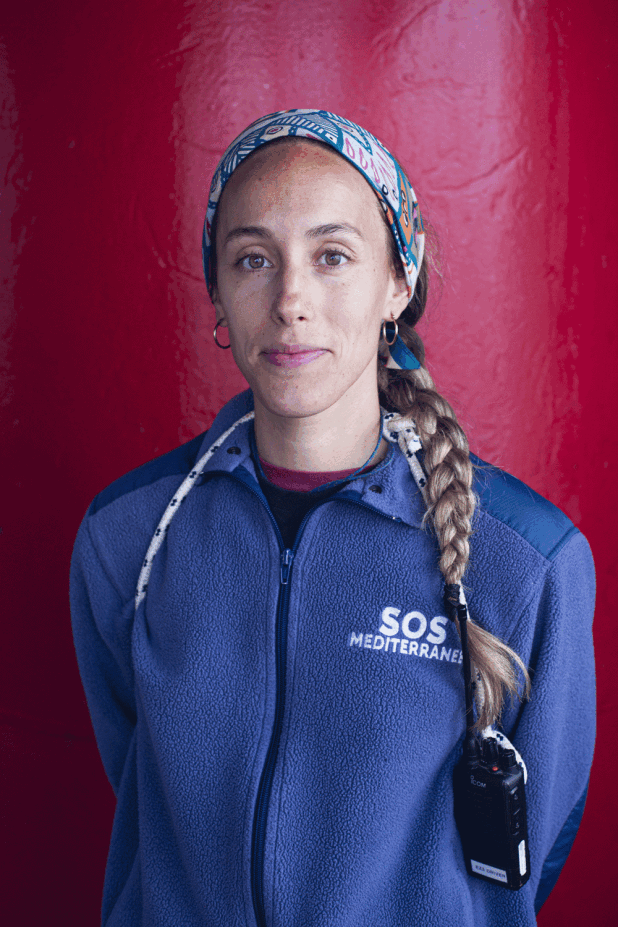
Mar
Having grown up by the water, Mar (meaning ‘sea’ in Spanish) had worked on boats throughout high school and college. After graduating, she began working with Sea Shepherd, an ocean conservation organization, before joining the SOS MEDITERRANEE crew.
Mar will never forget the first time she saw survivors arriving on the Ocean Viking. After a complex operation in rough weather, 29 survivors were brought on board the ship. “It was great to see how people from different places, with many different backgrounds, come together with the common idea that lives can’t be lost at sea.”
She still remembers her first mission when she joined the Ocean Viking crew as a fast-rescue boat driver. “For my first mission, it was a great position. It’s usually the last one launched in the water. Being on this boat allowed me to see the other fast rescue boats in action, to see how a whole rescue operation runs.”
Now a Search and Rescue Coordinator on the Ocean Viking, Mar still recognizes the value of teamwork and diversity of opinion aboard the Ocean Viking. Our collaborative and diverse team strengthens us and allows us to successfully save lives in the Mediterranean.

